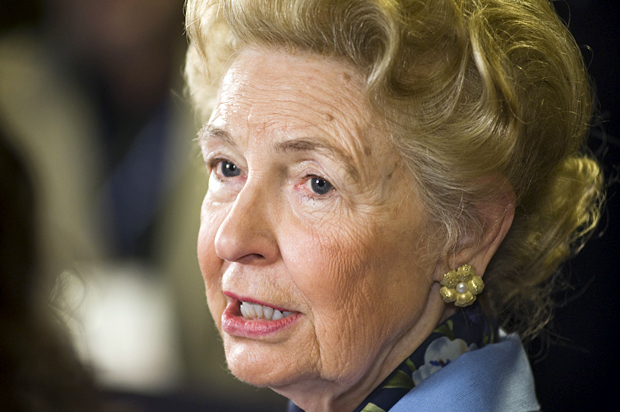In May 1983, an evangelical magazine in Australia reported that “seven talented and articulate Americans” had visited a leadership conference for conservatives near Melbourne. One of them was Phyllis Schlafly, who urged right-wing Australians to join with like-minded activists around the world in defense of “family values” — and against abortion, gay rights and sex education.
Schlafly was part of a global movement, which is a part of her identity that we tend to forget. When she died on Monday, obituaries dutifully reported her opposition to the United Nations, the Panama Canal treaties and the World Trade Organization. But most accounts ignored her efforts to unite with conservatives in other countries, which doesn’t fit our standard narrative about politics in the so-called age of globalization.
According to that story, liberals want to forge closer ties between different nations while conservatives want to protect national differences. One team celebrates the rapid movement of people and ideas across borders, and the other warns about the steady erosion of sovereignty inside them.
Yet even conservatives who denounce globalism have created their own global alliances, as Schlafly’s life illustrates. Just as Schlafly railed against working mothers while assuming new professional duties herself, she warned about the perils of international networks and created new ones at the same time.
Nearly a decade before her trip to Australia, for example, Schlafly was part of an American delegation that welcomed British sex-education opponent Mary Whitehouse to the United States. Denouncing school-based sex lessons for infringing upon parental rights, Whitehouse had become a fixture in the mass media and a thorn in the side of the education ministry in the United Kingdom. She even earned several mocking lines in Pink Floyd’s 1977 “Animals” album (“Hey you, Whitehouse/ Ha, ha, charade you are/ You gotta stem the evil tide/ And keep it all on the inside”), the only thing that most people remember about her today.
But like Schlafly, Whitehouse was a key figure in the rise of the global right. She came to America at the invitation of anti-pornography crusader Charles Keating, who would later gain notoriety for his role in the savings-and-loan scandal of the 1980s. She met with Catholic archbishop Fulton Sheen and with Richard Nixon’s communications director, Herb Klein. And she flew to St. Louis, Phyllis Schlafly’s hometown, to meet with Schlafly and Republican congressman Robert Dornan, who led a televised roundtable discussion with Whitehouse.
In its early iterations, this international movement focused mainly on Christians in the West. But it took a truly global turn in the 1990s, when activists like Schlafly began to coordinate with conservatives in Asia, Africa and Latin America. They coalesced around opposition to the 1994 International Conference on Population Development in Cairo, which endorsed “reproductive rights,” including access to contraception and sex education, for all human beings.
Five majority-Muslim countries — including Egypt, host of the conference — dissented from that resolution, as did two mostly Catholic nations and the delegation from the Vatican. “This conference must not be viewed by the teeming masses of the world as a universal social charter seeking to impose adultery, abortion, sex education and other matters on individuals, societies, and religions which have their own social ethos,” warned Pakistan’s prime minister, Benazir Bhutto, in a stinging speech to the Cairo conference. “The world needs consensus. It does not need a clash of cultures.”
It got one anyway, although not of the kind Bhutto imagined. Belying Samuel Huntington’s predicted battle royal between liberal and conservative societies, new configurations linked liberals — and conservatives — across these societies. On questions like abortion and sex education, organizations like International Planned Parenthood united advocates for greater access and choice. But conservatives created their own global networks like the World Congress of Families, which brought together “the most orthodox” members of different nations, as one of its leaders boasted in 1999.
“You will work alongside Catholics, Evangelicals, Jews, Muslims and Mormons,” another World Congress of Families activist told the group’s 2001 meeting. “We are the children of Abraham arising to fight for faith and family.” Other organizations in the global right reached out to Hindus in India, where conservatives blasted sex education as “a crime against the younger generation” and “a form of western aggression.” And they won the support of people in the West like Phyllis Schlafly, who blamed “radical feminists” in America and Europe for imposing their “secular agenda” upon the rest of the world.
Not surprisingly, today’s most famous anti-globalist moved quickly to claim Schlafly’s legacy. “Phyllis Schlafly is a conservative icon who led millions to action, reshaped the conservative movement, and fearlessly battled globalism,” Republican presidential nominee Donald Trump declared, in a post on his campaign website. That’s only half true. Even as she reviled globalism, Schlafly helped connect religious conservatives around the globe.
Trump has his own internationalist ambitions, of course, as his entreaties to Vladimir Putin and other right-wing leaders illustrate. But he’s no religious conservative, his periodic sops to American evangelicals notwithstanding. So how can he unite nationalists in the West and beyond, creating a new global movement against globalism? Traditional faith bound global conservatives such as Phyllis Schlafly, across borders and cultures. We’re about to find out if Donald Trump can find another way to do it.

